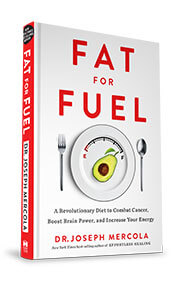Visit the Mercola Video Library
Story at-a-glance
-“Fat for Fuel,” released May 16, 2017, became an instant nationwide No. 1 best-seller, beating out the No. 2 best-selling book by a significant margin
-Despite outselling all other adult nonfiction in its first week, The New York Times didn’t even include “Fat for Fuel” in its top 15, saying the book was disqualified for excessive sales through Amazon
-“Fat for Fuel” was reviewed and edited by more than two dozen health experts, scientists and researchers, making it one of the few peer-reviewed books on health on the market
By Dr. Mercola
I’m very pleased to announce that my new book, “Fat for Fuel,” released May 16, became an instant best-seller. As noted by Publishers Weekly May 26:1
“Unit sales inched up 1 percent in the adult nonfiction segment, helped by a new top-selling title. ‘Fat for Fuel’ by Joseph Mercola sold more than 34,000 copies in its first week, easily beating ‘Astrophysics for People in a Hurry,’ by Neil deGrasse Tyson, which sold more than 23,000 copies and came in second on the category best-seller list.”
Nielsen ratings, considered the most accurate, show “Fat for Fuel” sold more than any other adult nonfiction book out there, yet The New York Times (NYT) — considered the pre-eminent list of best-selling books in the U.S. since 1931 — didn’t even include it in their top 15.2
Such a blatant omission is highly unusual, so Hay House, my publisher, reached out to find out why the book was being censored off the NYT best-seller list. NYT replied the book was “disqualified” because too many of the sales went through Amazon. This in and of itself is a bit unusual, considering Amazon is a primary outlet for all books.
Be that as it may, the New York Media LLC ring will not stop people from reading this book, or recognizing it as a true No. 1 best-seller. The Washington Post, for example, accurately lists “Fat for Fuel” as No. 1 for that first week.3
Why ‘Fat for Fuel’ Is Such an Important Book
I believe this is the most important book I’ve written so far, as the information it contains has the potential to save countless lives from chronic diseases like diabetes, heart disease and cancer. And, while peer review is the gold standard in medical journals, few books are ever peer reviewed. “Fat for Fuel” is a rare exception in this regard, as it was reviewed and edited by more than two dozen health experts, scientists and researchers.
Conventional, government-approved advice has utterly failed when it comes to weight and disease management. We’re facing overwhelming rates of obesity, heart disease, cancer and Alzheimer’s, with future projections heralding more of the same. We need a radical U-turn, and the foundations for how to accomplish that are clearly spelled out in this book.
The key to both weight management and optimal health is to optimize your mitochondrial function — hence, the term metabolic mitochondrial therapy (MMT) used in the book. In short, if your mitochondria are not functioning properly, none of your bodily systems will function properly, and in order for your mitochondria to work, having the metabolic flexibility to burn fat is essential.
“Fat for Fuel” explains the many metabolic advantages you gain once your body regains the ability to burn fat for fuel, and details how to do it. The initial phase of the MMT program — which ends once your body is able to effectively burn fat for fuel — can take anywhere from weeks to months or longer, depending on how metabolically damaged you are.
While much of the book centers around diet (raising the amount of healthy fat and decreasing net carbs is what pushes your body into burning fat for fuel), it also reviews a variety of other strategies to improve your mitochondrial function, such as cold thermogenesis, photobiology, detox, exercise, the dangers of iron overload and the pernicious influence of electromagnetic fields (EMFs).
Take Control of Your Health — And Help Others Do the Same
More than half of all Americans struggle with chronic illness and 1 in 5 deaths in the U.S. is obesity-related. It doesn’t have to be this way, and my book details the way forward, out of chronic disease into optimal health. For all of you who preordered the book, I extend my sincere thanks.
By hitting the best-seller list, many who may never even have heard of me or the concept of a cyclical ketogenic diet have the chance to find out about this foundational aspect of health.
Sales of the book will also help further important research by Thomas Seyfried, Ph.D., a leading authority on ketogenic diets and mitochondrial therapy, and author of “Cancer as a Metabolic Disease.” A portion of the proceeds from the book are being donated to support his ongoing (and truly groundbreaking) metabolic therapy for cancer research.
Considering Amazon is such an important outlet for book sales, I urge you to continue buying “Fat for Fuel” from Amazon, and to recommend it to your family and friends. If you prefer, you may also order it directly from FatforFuel.org, where you will also receive five free bonus gifts, including a free digital copy of my online magazine, a complete meal guide compiled by ketogenic experts and $5 off your next Mercola.com order.
Inability to Burn Fat for Fuel Is the Root Cause of Most Degenerative Conditions
As explained in “Fat for Fuel,” a foundational cause of most degenerative diseases is the fact that your mitochondria, the little powerhouses located in most of your body’s cells, are not burning a fuel that will minimize mitochondrial damage. This mitochondrial dysfunction lays the groundwork for subsequent breakdowns of various bodily systems.
Your mitochondria generate the vast majority of the energy (adenosine triphosphate or ATP) in your body. They’re also responsible for apoptosis (programmed cell death), and serve as important signaling molecules that help regulate your genetic expression. This is a function that even most doctors are unaware of.
Fundamentally, a healthy diet is one that supports mitochondrial function, and having the metabolic flexibility to burn fat is the key. The vast majority of people who eat a primarily processed food diet are burning carbohydrates as their primary fuel, which has the devastating effect of actually impairing your body’s ability to burn fat.
This is one of the primary reasons why obesity is so prevalent, and why so many find it nearly impossible to lose weight and keep it off. What’s worse, when your body burns primarily carbs for fuel, excessive reactive oxygen species (ROS) and secondary free radicals are created, which damage cellular mitochondrial membranes and DNA, leading to the degenerative diseases that are so prevalent today.
Many also eat far too much protein, which can have adverse consequences equal to or exceeding those of excessive net carbs. Excessive protein has a stimulating effect on the mammalian target of rapamycin (mTOR) — a biochemical signaling pathway that plays a significant role in the aging process and many cancers. Net carb restriction normalizes your insulin pathway while avoiding excessive protein normalizes mTOR, both of which are important for optimal health and disease prevention.
Healthy Fats Are Key Nutritional Components for Optimal Health
The importance of avoiding unhealthy fats and using healthy fats in your diet simply cannot be overstated. They’re important for a number of different reasons, including the following:
1. When your body is able to burn fat for fuel, your liver creates water-soluble fats called ketones that burn far more efficiently than carbs, thereby creating fewer reactive oxygen species (ROS) and secondary free radicals that can damage your cellular and mitochondrial cell membranes, proteins and DNA.
Ketones also decrease inflammation (as they are histone deacetylase (HDAC) inhibitors), improve glucose metabolism,4and aid the building of muscle mass.5
2. Healthy fats also play an important role in maintaining your body’s electrical system. All cellular membranes are made of fats, which act as insulators and are connected through a conductor. This arrangement sets up a biological capacitor to store electrons — but only if the fats are healthy.
When you consume damaged fats, or worse, heated and hydrogenated oils, the fatty acids in your cell membranes become nonfunctional and unable to store body voltage, which further boosts your risk for disease.
The Many Benefits of a Cyclical Ketogenic Diet
The MMT diet is basically a ketogenic diet (high in healthy fats and fiber, low in net carbs with a moderate amount of protein). However, it emphasizes CYCLICAL ketosis. Remaining in nutritional ketosis for long periods after you have regained the ability to burn fat as your primary fuel actually has significant drawbacks.
This is because when you suppress insulin for too long, your liver starts making more glucose to make up for the deficit. A process called hepatic gluconeogenesis and low insulin levels achieved in chronic ketosis facilitate this process. This is why it’s vital to cycle in and out of ketosis once you have achieved the ability to burn fat for fuel. So, just what might you gain from MMT? The following chart lists some of the most important benefits of this program:
|
Weight loss By rebalancing your body’s chemistry, weight loss and/or improved weight management becomes nearly effortless. Studies have shown a ketogenic diet can double the weight lost compared to a low-fat diet.6 By reducing hunger and carb cravings, it also lowers your risk of overeating. |
|
Reduced inflammation When burned for fuel, dietary fat releases far fewer ROS and secondary free radicals than sugar. Ketones are also very effective histone deacetylase inhibitors that effectively reduces inflammatory responses. In fact, many drugs are being developed to address immune related inflammatory diseases that are HDAC inhibitors. But, a safer and more rational strategy is to use a ketogenic diet, as it is one of the most effective ways to drive down your inflammation level through HDAC inhibition. |
|
Reduced cancer risk While all cells (including cancer cells) can use glucose for fuel, cancer cells lack the metabolic flexibility to use ketones for its energy needs, which your regular cells can. Once your body enters a state of nutritional ketosis, cancer cells are more susceptible to being removed by your body through a process called autophagy. A ketogenic diet is a fundamental, essential tool that needs to be integrated in the management of nearly every cancer. |
|
Increased muscle mass Ketones share a close structural similarity to branched-chain amino acids and seem to be preferentially metabolized. In other words, ketones spare those branched-chain amino acids, leaving higher levels of them around, which promotes muscle mass.7 However, be careful and make sure to implement cyclic ketosis. Chronic ketosis will actual result in muscle loss as your body is impairing the mTOR pathway, which is important for anabolic growth. mTOR needs to be stimulated, just not consistently, as many people do with high protein diets. |
|
Lowered insulin levels Keeping your insulin level low helps prevent insulin resistance, type 2 diabetes and related diseases. Research has demonstrated that diabetics who eat a low-carb ketogenic diet are able to significantly reduce their dependency on diabetes medication and may even reverse the condition.8 Lowering insulin resistance will also reduce your risk of Alzheimer’s. Recent research strengthens the link between insulin resistance and dementia even further, particularly among those with existing heart disease.9,10,11 |
|
Increased longevity One of the reasons you can survive a long time without food is due to the process of ketosis, which spares protein breakdown.12 A fairly consistent effect seen in people on a ketogenic diet is that blood levels of leucine and other important structural proteins go up, allowing these proteins to perform a number of important signaling functions. Ketones also mimic the life span extending properties of calorie restriction13 (fasting), which includes improved glucose metabolism; reduced inflammation; clearing out malfunctioning immune cells;14 reduced IGF-1, one of the factors that regulate growth pathways and growth genes and is a major player in accelerated aging; cellular/intracellular regeneration and rejuvenation (autophagy and mitophagy).15 |
Opportunities to Learn More
A large number of experts will lecture at the Low Carb USA event in San Diego, August 3 through 6. I will be one of the speakers along with Gary Taubes, author of “The Case Against Sugar,” and Stephen Phinney, a physician-scientist who has spent 35 years studying diet, exercise, fatty acids and inflammation. You can see the entire list of invited speakers lower on the page.
I am also speaking in Florida in November. If you are a physician and want to learn how you can use the ketogenic diet and other therapies for cancer, heart disease, Lyme and neurodegenerative diseases like Alzheimer’s and Parkinson’s, be sure to attend the ACIM conference in Orlando, Florida, November 2 through 4 at the wonderful Florida Conference and Hotel Center. Early Bird price for all three days ends July 1.
If you are a patient, there will be a separate and less expensive track on the same date and location. However, you will need to come back to this page at a later date, as the registration page for the event is still unavailable.

The strategies I present in my best-selling book, “Fat For Fuel,” are just too valuable for your well-being. That’s why you should not pass up this chance to ensure your copy!
And when you order today, you’ll receive 5 FREE “thank-you” gifts:
- Bonus 1: 20 percent OFF Cronometer Gold
- Bonus 2: A Healthy Recipe Guide
- Bonus 3: $5 OFF your next Mercola.com order
- Bonus 4: Online copy of my magazine
- Bonus 5: SMS Exclusive: My top interviews
















